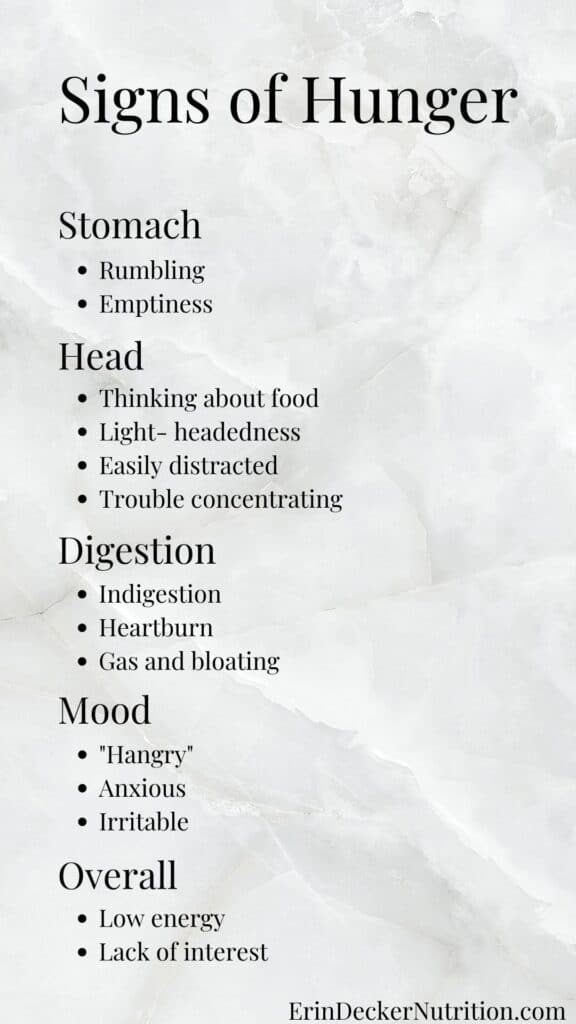Oh man… if “what to eat when you don’t know what to eat” doesn’t sum up the work that I do, I don’t know what does.
I’m serious. I’ve put together more meal ideas than one person could possibly make. From the busy parent, to the client recovering from an eating disorder, to the college student coping with ADHD – EVERYONE struggles with this at one point or another.
So what do you do? What do you eat when you don’t know what to eat? Here are some suggestions from an eating disorder dietitian.
Table of Contents
Identify and acknowledge the underlying reason for the uncertainty
There’s a chance you are here because you want to figure out what to eat right now. I promise I will share some suggestions in a moment – use the table of contents above to skip ahead if you wish.
But figuring out why you are overwhelmed is an important step in figuring this out in the long-term (teach a man to fish and all that.) Once you know your “why”, you can find a solution to the root when you are ready.
For instance, overcoming a lack of cooking skills is a vastly different problem than always feeling guilty after eating.
So ask yourself why you are unsure. Consider the following possibilities!
Are you overthinking what to eat?
Sometimes we are simply overthinking things. We are stuck in “analysis paralysis” because we are trying to come up with the perfect, balanced meal.
If you have lived your life according to a diet, this might sound like:
- If I have that sandwich for lunch then I can’t have any bread for dinner
- Chicken nuggets sound good but I shouldn’t eat processed foods
- I need to eat a vegetable – I only have a can of spinach though, I don’t want that
- I need to have protein with my breakfast but I’m sick of eggs
Lack of appetite
It is possible to be physically hungry, but not interested in putting together a meal. Meaning, your stomach is growling and your energy is low, but the desire to eat is not there.
This could be due to a number of things, such as distractions and other priorities, mental health challenges like depression, medication side effects, or maybe you have just never been a breakfast eater.
Take a moment to tune in. Stress, lack of sleep, poor boundaries, and inconsistent eating patterns are all “attunement disrupters”. These factors make it difficult to find “attunement”, or connection, with your body.
Is there something going on that could be making it difficult to hear your hunger?

Lack of planning
I can call this the “no food in the house” syndrome. Symptoms include opening your fridge every hour hoping for something new to show up.
Usually, this comes back to a lack of planning. We need to plan to eat.
This can look like a full blown meal plan for the week, or buying 15 TV dinners on Sunday. Both of these are acceptable and neither is morally “right”.
Lack of preparation and cooking skills
Building confidence in the kitchen can go a long way in figuring out what to eat. You might have plenty of food, but if you don’t know what to do with it, you’re not going to see it as an option.
Limited access
Sometimes we just don’t have access to much variety. For example, if you work the night shift, you might only have access to a select fast food restaurants (if that.)
There may be other reasons for your uncertainty, and you might experience a combination of these reasons. But getting to the root helps you accept this and move on to problem solving.
Don’t ignore or delay
It is common to ignore your hunger when you want to eat but you don’t know what to eat.
Like described earlier, we seem to think that if we open the fridge again in an hour, there will be some new options. As much as I would love this to be the case, it is unfortunately not reality.
Instead, when you ignore your hunger it comes back stronger later on. You are now stuck in that uncertain place and getting “hangrier” by the minute.
If you are working on your intuitive eating skills, this can put you at risk for primal hunger, or the place where you eat anything and everything in sight. It’s really hard to make mindful decisions when you‘re hangry!
Bottom line: make sure you eat something.
Investigate what sounds good
Get curious about what you would like to eat. For this exercise, assume anything goes. In a perfect world, what textures and flavors sound good?
| Texture | Examples | Flavor | Examples |
| Crispy | Potato chips, fried foods | Sweet | Fruit, honey/maple syrup, candy, pastries |
| Crunchy | Crackers, nuts, apple, raw peppers/celery/carrots, Popcorn | Savory | Cheese, roasted or grilled meats and vegetables |
| Smooth | Peanut butter, yogurt, ice cream, avocado | Salty | Chips, soy sauce, french fries, |
| Sticky | Toffee, caramel, taffy, dried fruit | Sour | Vinegar, lemon/lime, plain yogurt |
| Gummy | Gummy bears, dried fruit | Bitter | Coffee, dark chocolate, kale, sesame |
| Juicy | Apple, pear, watermelon, oranges | ||
| Chewy | Bread/bagel, pizza crust | ||
| Tender | Steak, chicken thigh |
Consider your options
Once you know what you want, consider what you have accessible. Consider your fridge, freezer, pantry, take out, order in, etc. Can you make something work?
Consider gentle nutrition
Once you have a starting place, consider incorporating gentle nutrition if it makes sense. Gentle nutrition involves thinking about nutrition, but not letting it drive your decision.
Generally, a balanced meal has multiple food groups. Gentle nutrition might mean having some roasted vegetables alongside your steak if it is accessible.
Gentle nutrition also acknowledges that eating something is more important than eating perfectly or balanced.
So, not feeling the protein for this meal? That’s ok – there will be other opportunities.
What if you still don’t know what to eat?
If you made it this far and you still don’t know what to eat, return to step #2. Just commit to eating something. Then, you can move on and revisit later on.
Unless you have an unlimited budget for door dash, you are most likely limited by the food in your home or the time you have. This might mean your meal is not fully satisfying or exactly what you wanted.
Sometimes intuitive eating means eating something that doesn’t sound good. Or eating for the sake of fueling your body. Sometimes self care is eating what and when you don’t want to because that’s what keeps us going.
What is your go-to when you don’t know what to eat?
